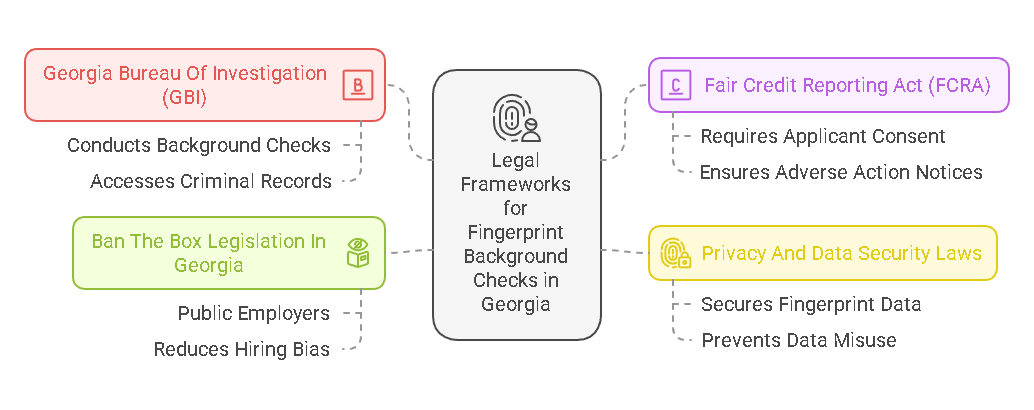Georgia Fingerprint Background Check: An Essential Overview
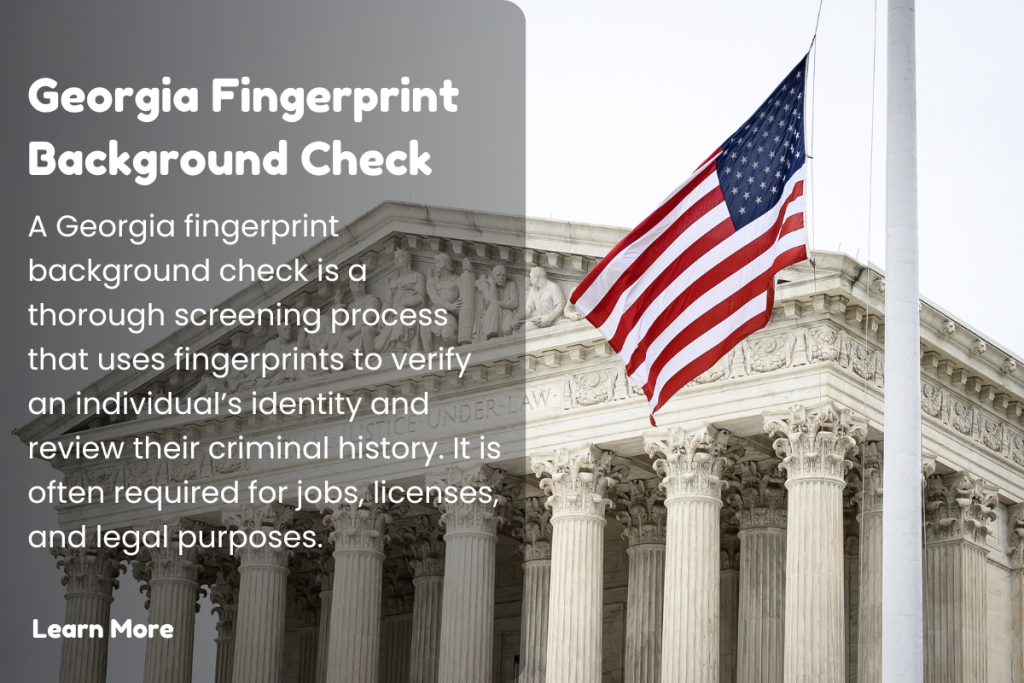
What Is a Georgia Fingerprint Background Check?
A Georgia fingerprint background check is a biometric-based verification process that uses an individual’s unique fingerprint patterns to access criminal and identity records. Unlike traditional name-based background checks, fingerprint checks rely on immutable physical characteristics, reducing the chances of errors caused by name variations or identity theft.
This method is frequently employed in sensitive industries and positions requiring a high level of trust. Employers, licensing boards, and government agencies across Georgia utilize fingerprint checks to ensure they hire or work with individuals who meet legal and ethical standards.
Fingerprint background checks are particularly valuable for roles that involve direct interaction with vulnerable populations, such as children, the elderly, or individuals with disabilities. By ensuring the integrity and safety of professionals in such roles, fingerprint checks contribute to a safer community.
Why Are Fingerprint Background Checks Required in Georgia?
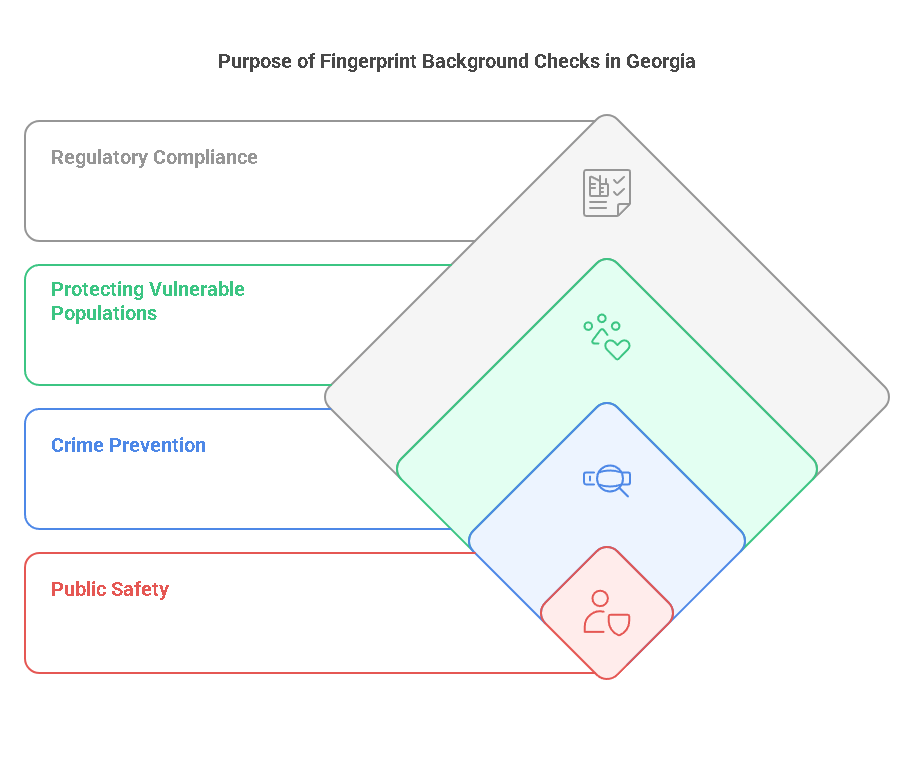
Fingerprint background checks are not just a precautionary measure; in many cases, they are mandated by law in Georgia. These checks serve as a robust safeguard to protect public safety and maintain professional accountability in various industries.
Key Reasons for Requiring Fingerprint Background Checks:
- Workplace Safety and Security: Employers need assurance that employees, especially those in sensitive roles, do not pose a threat to colleagues or the public.
- Regulatory Compliance: Many professional licensing boards require fingerprint-based checks to confirm an applicant’s eligibility for licensure.
- Protecting Vulnerable Populations: Fingerprint background checks are critical in industries such as healthcare, childcare, and education, where employees have significant responsibility for others’ well-being.
- Crime Prevention: By identifying individuals with disqualifying criminal histories, these checks help deter potential risks and uphold the integrity of organizations.
For instance, teachers, nurses, and law enforcement officers must undergo fingerprint background checks as part of their employment process. These measures ensure that only qualified and trustworthy individuals are entrusted with such responsibilities.
How Fingerprint Background Checks Are Conducted in Georgia
The process of conducting a fingerprint background check in Georgia is overseen by the Georgia Bureau of Investigation (GBI), which collaborates with the Federal Bureau of Investigation (FBI) for nationwide record verification.
Steps Involved in the Process:
- Fingerprint Collection:
- Applicants visit an authorized fingerprinting center, where fingerprints are captured electronically using advanced scanning technology.
- These scans are designed to ensure high-quality prints for accurate results.
- Submission to the GBI:
- The collected fingerprints are submitted to the GBI, which searches its state criminal databases.
- Federal Database Search:
- In some cases, fingerprints are forwarded to the FBI to check for records in federal databases, providing a broader scope of information.
- Processing and Reporting:
- Once the checks are completed, results are transmitted to the requesting organization, such as an employer or licensing agency.
Fingerprint background checks are considered more reliable than name-based checks due to their precision and resistance to manipulation.
Common Applications of Fingerprint Background Checks in Georgia
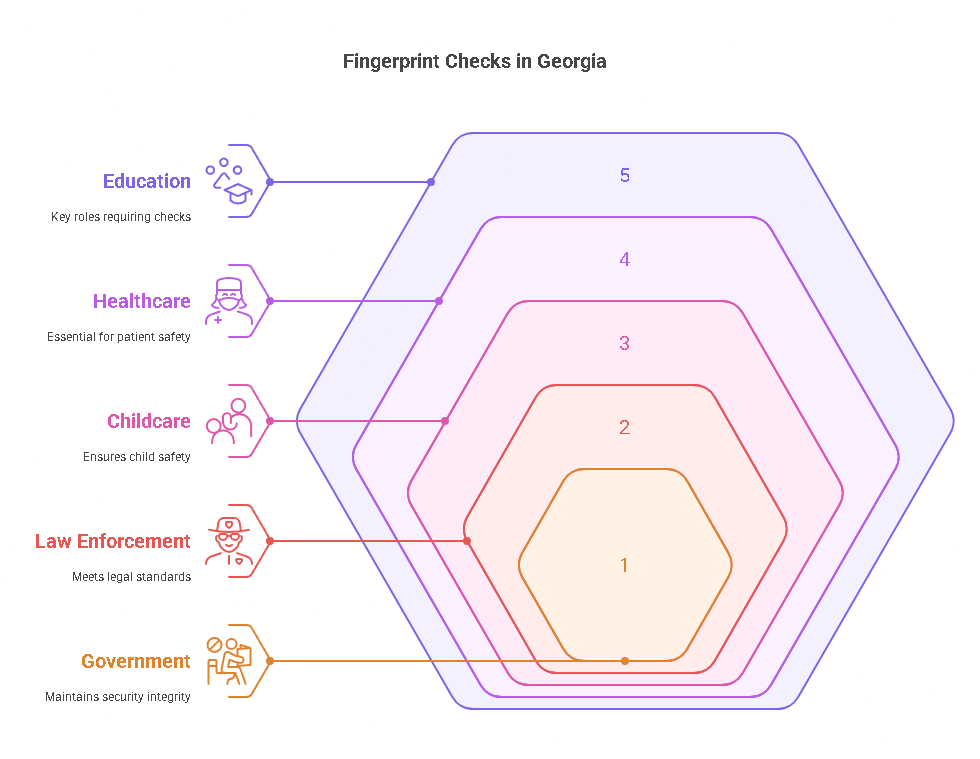
Fingerprint background checks are employed across various industries and roles in Georgia, particularly in fields where safety, trust, and compliance are paramount.
Industries and Situations Where Fingerprint Checks Are Common:
- Education: Teachers, school administrators, and other staff are required to pass fingerprint background checks before employment to ensure the safety of students.
- Healthcare: Hospitals and clinics mandate these checks for nurses, doctors, and other healthcare professionals to protect patient safety.
- Childcare and Foster Care: Daycare providers, foster parents, and adoption applicants must demonstrate a clean record through fingerprint verification.
- Law Enforcement and Security: Police officers, correctional officers, and private security personnel undergo fingerprint checks to meet stringent legal and ethical standards.
- Government and Sensitive Roles: Many government positions require fingerprint background checks to maintain national and state security.
Fingerprint background checks also play a critical role in various licensing processes, such as obtaining real estate, pharmacy, or nursing licenses.
Challenges and Limitations of Fingerprint Background Checks
Despite their widespread use and reliability, fingerprint background checks are not without challenges. Understanding these limitations is crucial for individuals and organizations relying on them for decision-making.
- Fingerprint Quality Issues:
- Poor-quality scans due to smudges, scars, or improper equipment can result in delays or inconclusive results.
- Incomplete or Outdated Records:
- Criminal databases may not always have the latest updates, leading to gaps in information.
- Cost and Accessibility:
- While essential, fingerprint background checks can be costly for individuals and organizations. Limited access to fingerprinting centers in rural areas may also pose logistical challenges.
- Privacy Concerns:
- Some individuals may hesitate to undergo fingerprinting due to concerns about how their biometric data will be stored and used.
- Misidentification Risks:
- Though rare, errors in database records can lead to incorrect associations, requiring applicants to take additional steps to correct them.
Addressing these challenges requires coordination between applicants, organizations, and regulatory agencies to ensure accuracy and fairness in the process.
How to Obtain a Fingerprint Background Check in Georgia
Obtaining a fingerprint background check in Georgia involves a structured process managed by the Georgia Bureau of Investigation (GBI) and authorized fingerprinting service providers. These checks are a requirement for many industries, licensing agencies, and government organizations.
Steps to Obtain a Fingerprint Background Check in Georgia:
- Determine Eligibility:
- Confirm whether you or your organization requires a fingerprint background check. These are often mandated for professions such as education, law enforcement, healthcare, and childcare.
- Identify an Authorized Fingerprinting Center:
- Georgia utilizes designated providers, such as Gemalto Cogent, for fingerprinting services. These centers ensure fingerprints are captured electronically with minimal errors.
- Register Online:
- Visit the GBI or the fingerprinting service provider’s website to register for an appointment.
- Provide necessary details, including the purpose of the background check and any reference numbers issued by the requesting agency.
- Prepare for the Appointment:
- Bring valid government-issued identification, such as a driver’s license or passport.
- Ensure hands are clean and free of oils or lotions to prevent smudges during fingerprint capture.
- Fingerprint Capture:
- Attend the appointment where your fingerprints will be scanned digitally.
- The technician will ensure high-quality prints to avoid rejections.
- Submission and Processing:
- The fingerprints are submitted to the GBI, and in some cases, forwarded to the FBI for a federal criminal history check.
- Processing times typically range from a few days to a couple of weeks, depending on the complexity of the request.
- Receive the Results:
- Results are sent directly to the requesting agency or employer. Individuals may also request personal copies for review.
How to Correct Errors in a Georgia Fingerprint Background Check
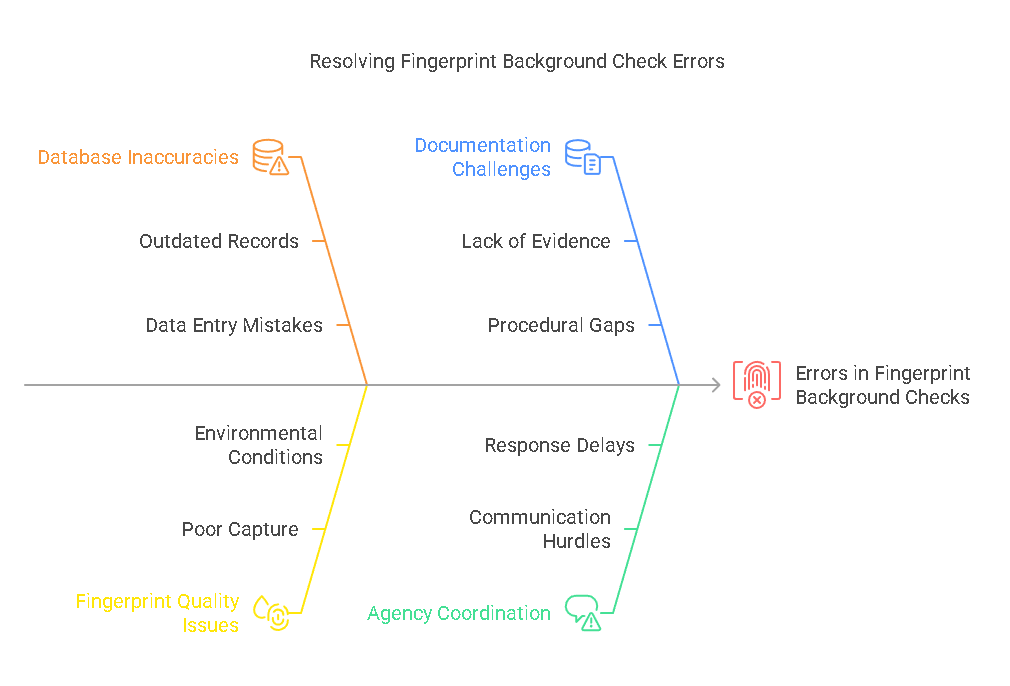
Errors in fingerprint background checks, though rare, can occur due to database inaccuracies, outdated records, or issues with fingerprint quality. Correcting these errors promptly is crucial to avoid negative consequences, such as job disqualification or delayed licensure.
Steps to Resolve Errors:
- Review the Report:
- Obtain a copy of your fingerprint background check to identify specific errors, such as incorrect criminal records or misidentification.
- Contact the Georgia Bureau of Investigation (GBI):
- Reach out to the GBI to report inaccuracies. Provide documentation, such as court records or police reports, to support your claim.
- Request a Recheck:
- If the issue stems from poor-quality fingerprints, schedule a new fingerprinting appointment to ensure a better capture.
- Dispute Federal Errors:
- If the error involves federal records, file a dispute with the FBI using their Identity History Summary Request system.
- Follow Up:
- Regularly check the status of your dispute or correction request to ensure timely resolution.
Correcting errors requires persistence and cooperation with the relevant agencies. Always retain copies of correspondence and supporting documents for reference.
Legal Protections and Regulations Surrounding Fingerprint Background Checks in Georgia
Fingerprint background checks in Georgia are subject to state and federal regulations to ensure fair and lawful use. These laws govern who can request the checks, how data is stored, and the rights of individuals undergoing the process.
Key Legal Frameworks:
- Fair Credit Reporting Act (FCRA):
- Protects individuals by requiring employers to obtain written consent before conducting background checks.
- Provides applicants with the right to dispute inaccurate information.
- Georgia Laws Governing Background Checks:
- Certain professions, such as healthcare and education, are required by Georgia law to undergo fingerprint checks for licensure and employment.
- Employers must follow strict guidelines when using these checks to make hiring decisions, ensuring compliance with anti-discrimination laws.
- Data Privacy Protections:
- Agencies and employers must securely store fingerprint data and use it solely for the intended purpose.
- Ban the Box Initiative:
- While not specific to fingerprint checks, this Georgia policy restricts employers from inquiring about criminal history on initial job applications, ensuring fair consideration of all candidates.
Understanding these protections empowers individuals to navigate the fingerprint background check process confidently and address potential concerns about misuse or discrimination.
How Employers in Georgia Use Fingerprint Background Checks
Employers in Georgia utilize fingerprint background checks to verify an applicant’s criminal history and ensure compliance with industry regulations. These checks are particularly crucial for roles involving safety, trust, or access to sensitive information.
Industries Relying on Fingerprint Background Checks:
- Education: To ensure the safety of students, school districts require teachers, administrators, and support staff to pass fingerprint checks.
- Healthcare: Hospitals and clinics mandate checks for professionals handling patient care or medical records.
- Law Enforcement: Police officers and correctional officers must undergo stringent fingerprint checks to meet legal standards.
- Childcare and Elder Care: Organizations serving vulnerable populations prioritize fingerprint checks to maintain safety and trust.
Employers must adhere to state and federal regulations, including informing applicants of their rights and providing them with opportunities to dispute inaccuracies.
PreciseHire’s Role in Fingerprint Background Checks
When accuracy and compliance are paramount, businesses and individuals turn to PreciseHire for their fingerprint background check needs. As a trusted provider of background screening services, PreciseHire ensures a seamless and reliable process for clients in Georgia.
Services Offered by PreciseHire:
- Accurate Fingerprint Background Checks:
- PreciseHire uses advanced technology to ensure precise results, reducing the risk of errors.
- Compliance Support:
- The company helps organizations navigate Georgia’s legal requirements, ensuring adherence to state and federal laws.
- Error Resolution Assistance:
- PreciseHire provides guidance on correcting inaccuracies in fingerprint background checks, saving clients time and effort.
- Customized Solutions:
- Tailored services meet the unique needs of different industries, from healthcare to education.
Partnering with PreciseHire simplifies the complex process of fingerprint background checks, allowing businesses to focus on their core operations while ensuring safety and compliance.
Best Practices for Ensuring Accurate and Timely Fingerprint Background Checks

Both individuals and organizations can take proactive steps to enhance the accuracy and efficiency of fingerprint background checks.
Tips for Individuals:
- Prepare for the Appointment: Ensure clean and dry hands for better-quality fingerprints.
- Double-Check Personal Information: Provide accurate details during registration to avoid processing errors.
- Follow Up Promptly: If there are delays, contact the relevant agency to check the status of your request.
Tips for Organizations:
- Use Authorized Providers: Work with reliable fingerprinting centers to ensure high-quality scans.
- Stay Updated on Regulations: Regularly review Georgia and federal laws to maintain compliance.
- Partner with Trusted Experts: Collaborate with companies like PreciseHire for reliable screening solutions.
Sample Data Table: Steps to Resolve Errors in Fingerprint Background Checks
| Step | Action | Agency Involved |
|---|---|---|
| Review the Report | Identify specific inaccuracies. | Individual/Employer |
| Contact GBI | Report errors in state records. | Georgia Bureau of Investigation |
| Request a Recheck | Schedule a new fingerprinting appointment. | Authorized Fingerprinting Center |
| Dispute Federal Errors | File a claim with the FBI for federal issues. | Federal Bureau of Investigation |
| Provide Documentation | Submit court records or police reports. | GBI/FBI |
This detailed process helps ensure that errors are corrected effectively and efficiently.

